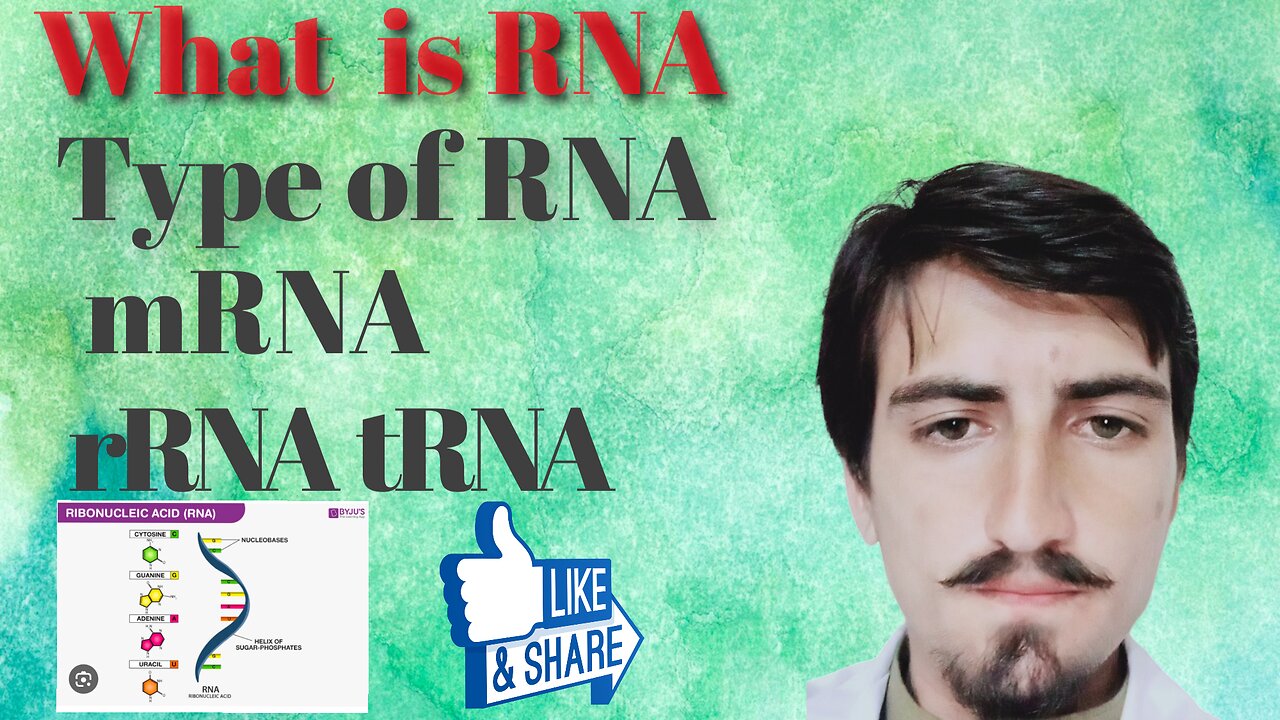Premium Only Content

RNA (Ribonucleic Acid) is a molecule that plays a crucial role in various cellular processes, including protein synthesis, gene regulation, and more. There are several types of RNA, each with specific functions in the cell. Here are some of the major types of RNA:
Messenger RNA (mRNA): mRNA carries the genetic information from the DNA in the cell nucleus to the ribosomes, where protein synthesis (translation) takes place. It serves as a template for protein synthesis by specifying the sequence of amino acids in a protein.
Transfer RNA (tRNA): tRNA molecules are responsible for bringing the amino acids to the ribosome during protein synthesis. Each tRNA molecule carries a specific amino acid and has an anticodon sequence that matches the codon on the mRNA, ensuring the correct amino acid is incorporated into the growing polypeptide chain.
Ribosomal RNA (rRNA): rRNA is a structural component of ribosomes, which are cellular organelles responsible for protein synthesis. Ribosomes are made up of both rRNA and proteins, and they catalyze the bonding of amino acids to form a polypeptide chain according to the mRNA template.
Small Nuclear RNA (snRNA): snRNA molecules are involved in the splicing of pre-mRNA during the processing of gene transcripts. They are essential for removing introns (non-coding regions) and joining exons (coding regions) to form mature mRNA.
Small Nucleolar RNA (snoRNA): snoRNA molecules are primarily found in the nucleolus and are involved in the modification and processing of ribosomal RNA (rRNA) molecules. They guide the chemical modifications of specific nucleotides in rRNA.
MicroRNA (miRNA): miRNAs are small RNA molecules that play a role in gene regulation by binding to complementary sequences in mRNA molecules. This binding can lead to mRNA degradation or inhibition of translation, thus regulating gene expression.
Small Interfering RNA (siRNA): siRNAs are similar to miRNAs in that they also play a role in gene regulation. They are typically involved in the defense against viral infections and can be artificially introduced into cells to silence specific genes in a process known as RNA interference (RNAi).
Long Non-Coding RNA (lncRNA): These are RNA molecules that are longer than typical non-coding RNAs and do not code for proteins. They have diverse roles in regulating gene expression, chromatin structure, and other cellular processes.
Vault RNA (vtRNA): Vault RNAs are found in large ribonucleoprotein particles called vaults. Their precise function is not yet fully understood, but they may be involved in cellular transport and other processes.
These are some of the major types of RNA in cells, each with its own specific functions in the regulation and execution of various cellular processes.
-
 LIVE
LIVE
Total Horse Channel
1 day agoYELLOWSTONE SLIDE I | SATURDAY
333 watching -
 23:52
23:52
The Rad Factory
3 hours ago $0.67 earnedIs My Formula Race Car Faster Than a Go Kart?
7.06K1 -
 20:56
20:56
marcushouse
3 hours ago $1.12 earnedStarship Flight Test 9 Vehicles FINALLY Prepare, and Huge Starbase Upgrades – It's All Happening!
11.3K10 -
 23:48
23:48
CatfishedOnline
17 hours agoVictim's Life is Threatened After He Gets in Too Deep With a Crypto Scammer
8.37K2 -
 8:40
8:40
Shea Whitney
4 hours ago $0.74 earned12 Fashion Mistakes Making You Look OLD & OUTDATED!
10.9K3 -
 29:18
29:18
TampaAerialMedia
5 hours ago $0.24 earnedUpdate SARASOTA, FL 2025 - St Armands, Lido, & Longboat Key
7.22K1 -
 15:52
15:52
ARFCOM Reviews
22 hours ago $0.42 earnedNew Entry Level RDS | Primary Arms MD 21 GLx/SLx
9.24K3 -
 44:55
44:55
BEK TV
18 hours agoUNDENIABLE PROOF: CHEMTRAILS, CHEMICAL FOG & USAID EXPOSED—THEY'RE POISONING US FROM ABOVE!
7.61K5 -
 36:59
36:59
Kyle Rittenhouse Presents: Tactically Inappropriate
2 hours ago $0.55 earnedThe Man Who Stared Down Putin: Tucker Carlson
8.28K2 -
 1:58
1:58
Memology 101
2 days ago $0.38 earnedJamie Raskin THREATENS retribution against Nayib Bukele & other WORLD LEADERS for working with Trump
5.78K17